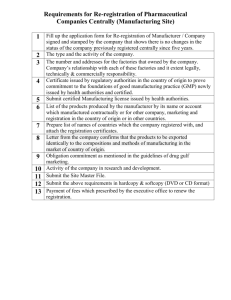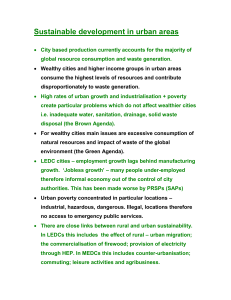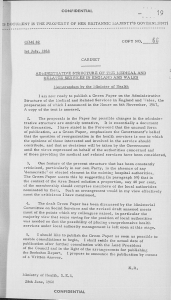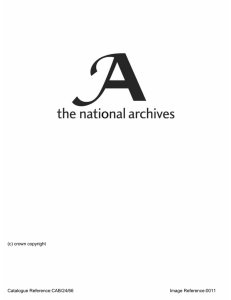C P .
advertisement
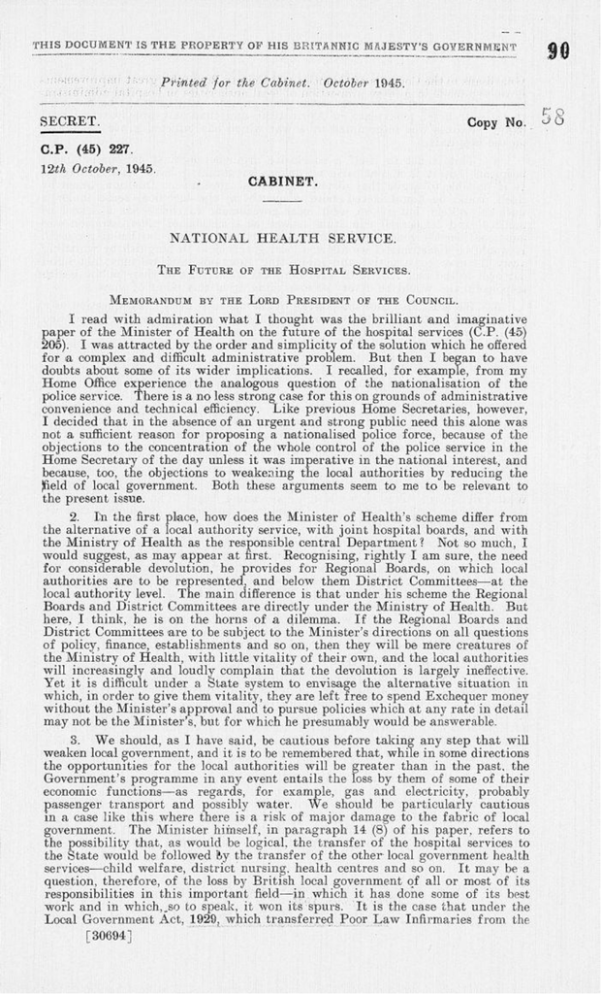
Printed for the Cabinet. October 1945. SECRET. Copy No. C P . (45) 227. 12th October, 1945. CABINET. NATIONAL HEALTH SERVICE. THE FUTURE OF THE HOSPITAL SERVICES. MEMORANDUM BY THE LORD PRESIDENT OF THE COUNCIL. I read with admiration what I thought was the brilliant and imaginative paper of the Minister of Health on the future of the hospital services ( O P . (45) 205). I was attracted by the order and simplicity of the solution which he offered for a complex and difficult administrative problem. But then I began to have doubts about some of its wider implications. I recalled, for example, from my Home Office experience the analogous question of the nationalisation of the police service. There is a no less strong case for this on grounds of administrative convenience and technical efficiency. Like previous Home Secretaries, however, I decided that in the absence of an urgent and strong public need this alone was not a sufficient reason for proposing a nationalised police force, because of the objections to the concentration of the whole control of the police service in the Home Secretary of the day unless it was imperative in the national interest, and because, too, the objections to weakening the local authorities by reducing the ^ield of local government. Both these arguments seem to me to be relevant to the present issue. 2. I n the first place, how does the Minister of Health's scheme differ from the alternative of a local authority service, with joint hospital boards, and with the Ministry of Health as the responsible central Department ? Not so much, I would suggest, as may appear a t first. Recognising, rightly I am sure, the need for considerable devolution, he provides for Regional Boards, on which local authorities a r e to be represented, and below them District Committees—at the local authority level. The main difference is t h a t under his scheme the Regional Boards and District Committees are directly under the Ministry of Health. But here, I think, he is on the horns of a dilemma. If the Regional Boards and District Committees a r e to be subject to the M i n i s t e r s directions on all questions of policy, finance, establishments and so on, then they will be mere creatures of the Ministry of Health, with little vitality of their own, a n d the local authorities will increasingly and loudly complain that the devolution is largely ineffective. Yet it is difficult under a State system to envisage the alternative situation in which, in order to give them vitality, they are left free to spend Exchequer money without the M i n i s t e r s approval and to pursue policies which a t any r a t e in detail may not be the M i n i s t e r s , but for which he presumably would be answerable. 3. We should, as I have said, be cautious before taking any step t h a t will weaken local government, and it is to be remembered that, while in some directions the opportunities for the local authorities will be greater than in the past, the Governments programme in any event entails the loss by them of some of their economic functions—as regards, for example, gas and electricity, probably passenger transport and possibly water. We should be particularly cautious in a case like this where there is a risk of major damage to the fabric of local government. The Minister himself, in p a r a g r a p h 14 (8) of his paper, refers to the possibility that, as would be logical, the transfer of the hospital services to the State would be followed fcy the transfer of the other local government health services—child welfare, district nursing, health centres and so on. I t may be a question, therefore, of the loss by British local government of all or most of its responsibilities in this important field—in which it has done some of its best work and in which,.so to speak, it won its spurs. I t is the case t h a t under the Local Government Act, 1929, which transferred Poor L a w Infirmaries from the [30694] Guardians to the Councils of Counties and County Boroughs, great improvements have been made by a large proportion of local authorities in hospital administra­ tion, without any specific Government grant-in-aid. A n d let it not be forgotten t h a t the transfer took place in A p r i l 1930, and that only nine years elapsed before progress was interrupted by a war which has inflicted grave difficulties on the hospitals. 4. This is not in itself a conclusive argument against nationalising the hospitals, but it is a conclusive argument for thinking hard before doing it. I t is possible to a r g u e t h a t almost every local government function, taken by itself, could be administered more efficiently in the technical sense under a national system, but if we wish local government to thrive—as a school of political and democratic education as well as a method of administration—we must consider the general effect on local government of each particular proposal. I t would be disastrous if we allowed local government to languish by whittling away its most constructive and interesting functions, a n d we must not blind our eyes to the fact t h a t to deprive the local authorities of their public health responsibilities would be a very serious thing from this point of view. 5. We must also face the politics of the matter. I t is not a question of a battle with some of the local authorities, such as, for example, would be entailed by a transfer of functions from district to county councils. All the local authorities will be u p in arms, those not directly affected ranged alongside the others by the challenge and the threat to local government as such. Beside them there will be the voluntary hospitals, and possibly a substantial proportion of the doctors. Our own people will be divided. Labour councils will be as apprehensive as the others, and we shall have to be prepared for opposition from the Government side of the House, and disunity in the party in the counties. The municipal elections are coming on—in November and in the Spring—and this would hardly be a resounding platform for Labour to use in capturing the local authorities. As to the public, there is a great deal of local pride in the hospitals, both public and voluntary, much sentiment attaches to them, and 1 cannot believe t h a t any sufficient enthusiasm would be evoked for what would be represented as a scheme for bringing the hospitals under bureaucratic Whitehall control. And, I would add, we cannot claim to have a mandate for the proposal : there is nothing in " Let us face the F u t u r e " to suggest that we intended to do this. 6. I suggest, too, t h a t we should think seriously before embarking on a project which would still further hold up the completion of the scheme for a National Health Service. For this would be the inevitable consequence of the struggle with the local authorities and the other interests, and of the prolonged negotiations which would be involved. The National Health Service scheme has been delayed long enough. Only in the last resort should we be prepared to introduce new delays, and it would be unfortunate to prejudice it at the outset by creating a needless atmosphere of strife and suspicion by forcing through a measure which would be likely to have few supporters and many opponents. 7. I am fully alive to the drawbacks of joint authorities—I dislike them thoroughly—hut in this case, a t any r a t e for the present, I think t h a t they provide the best way out of an admittedly difficult administrative problem. I recognise that, judged purely as a piece of administrative machinery, nationalisation may be superior to a local authority system with joint hospital boards, though, as 1 have pointed out, the Minister of Health's scheme does not differ so radically from such a system. Nor do I exclude the possibility that after the National Health Service has been in operation for a time and experience of its working has been obtained, it may not be found desirable to revive the idea of nationalisation in more auspicious circumstances. But I feel sure that any superiority which on administrative grounds the Minister's scheme possesses is outweighed by its disadvantages—"in particular the potentially serious consequences to local govern­ ment of slicing off one of its most cherished functions, the antagonism and suspicion which the Government would arouse amongst local authorities throughout the land, and the delay in setting up the National Health Service and the possible prejudicial effect upon it when it was launched in the end. H. M. Office of the Lord President of the Council, S.W. 1, 12th October, 1945.




